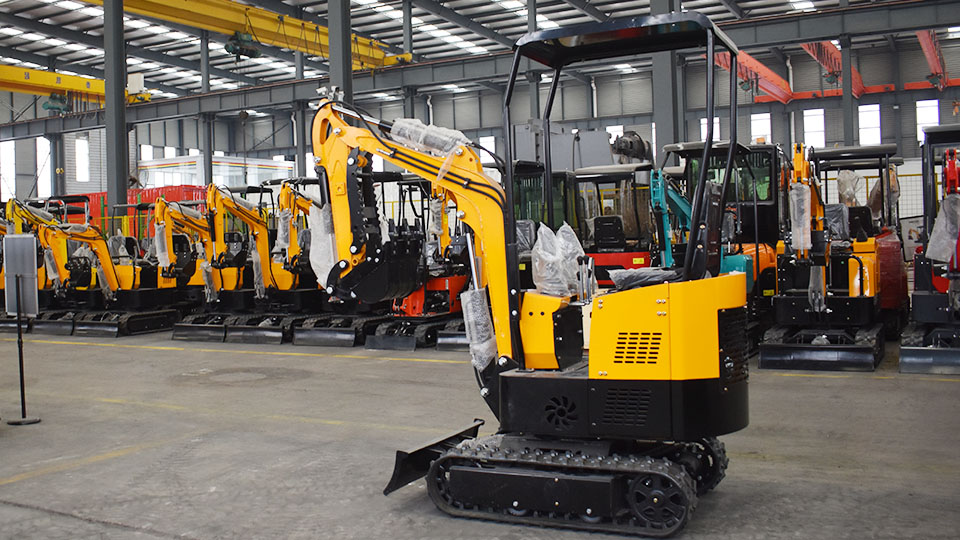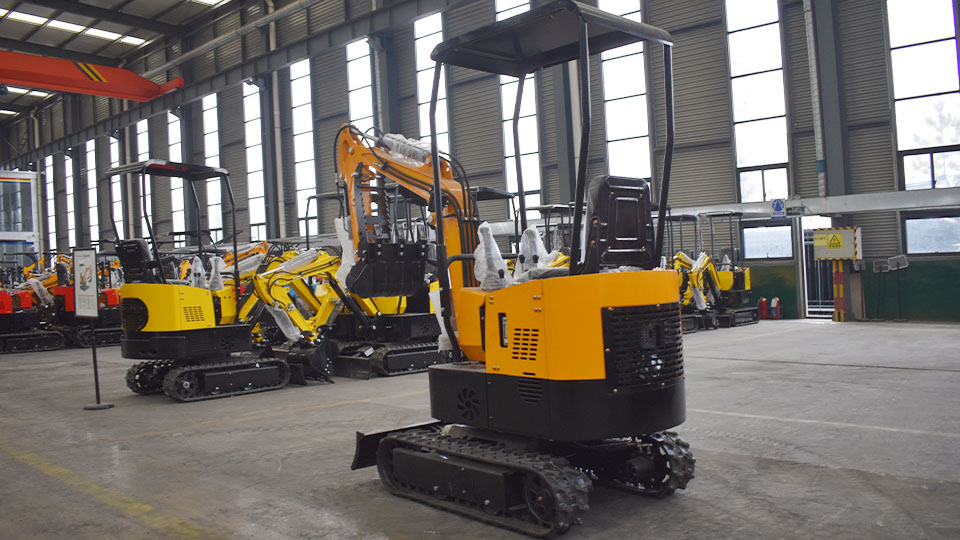Renting a mini excavator is a practical and cost-effective solution for many construction projects that require excavation work in tight spaces. However, the cost of renting such equipment can vary widely depending on several factors. This comprehensive guide will delve into the various aspects that influence the rental cost of a mini excavator, providing you with the necessary information to budget effectively for your next construction project.
Understanding Mini Excavators
A mini excavator is a compact, versatile piece of construction equipment designed for digging, trenching, and other excavation tasks in areas where larger excavators cannot operate due to space constraints. They are typically used in urban construction, landscaping, and other projects requiring precision and minimal disturbance to the surrounding environment. Understanding the capabilities and limitations of mini excavators is crucial for selecting the right equipment for your project.
Factors Influencing Rental Costs
Several factors can influence the cost of renting a mini excavator. Understanding these factors can help you anticipate and manage your rental expenses more effectively.
1. Location
The geographical location where you need the excavator can significantly impact the rental cost. Urban areas or regions with high demand for construction services might charge higher rental rates compared to rural areas. Additionally, the distance from the rental company to your project site can affect delivery and transportation costs.
2. Equipment Specifications
Different models of mini excavators come with varying specifications, such as engine size, digging depth, and operational capabilities. High-performance models with advanced features will naturally cost more to rent. It's crucial to choose an excavator that meets your project requirements without overpaying for unnecessary features.
3. Rental Duration
The length of time you need the excavator is another critical factor. Most rental companies offer daily, weekly, and monthly rental rates. Longer rental periods typically offer lower daily rates, making them more cost-effective for extended projects. However, it's essential to estimate your project timeline accurately to avoid unnecessary expenses.

4. Operating Hours
Some rental companies charge based on operating hours rather than calendar days. This can be beneficial if your project has variable work hours or if you need the excavator for specific tasks that don't require full-day operation. Understanding how the rental company calculates hours can help you choose the most cost-effective option.
5. Maintenance and Service
The condition of the excavator and the rental company's maintenance policies can also affect the rental cost. Well-maintained equipment is less likely to break down, reducing downtime and potential additional costs. Some rental agreements include maintenance and service, while others require the renter to cover these expenses.
6. Insurance and Liability
Construction projects often involve risks, and having the right insurance coverage is crucial. Rental agreements may include liability insurance, or you might need to obtain separate coverage. Understanding the insurance requirements and costs associated with renting a mini excavator is essential to avoid unexpected expenses.
7. Additional Equipment and Accessories
If your project requires additional equipment or accessories, such as buckets, augers, or hammers, these can add to the rental cost. Some rental companies offer package deals that include necessary attachments, which can be more cost-effective than renting them separately.
Average Rental Rates
While rental rates can vary widely based on the factors mentioned above, here's a general overview of what you might expect to pay for renting a mini excavator:
Daily Rental: $150 to $300 per day
Weekly Rental: $700 to $1,500 per week
Monthly Rental: $2,500 to $5,000 per month
These rates are approximate and can fluctuate based on location, equipment specifications, and market demand. It's always a good idea to get quotes from multiple rental companies to compare rates and services.
Tips for Budgeting Your Rental Costs
To ensure that your rental costs stay within budget, consider the following tips:
1. Plan Ahead
Start planning your project well in advance to secure the best rental rates and availability. Early planning also allows you to compare different rental companies and negotiate better deals.
2. Choose the Right Equipment
Select an excavator that meets your project requirements without overpaying for unnecessary features. Consult with the rental company to ensure you choose the most suitable model for your needs.
3. Negotiate Rates
Don't be afraid to negotiate rental rates, especially for extended periods. Many rental companies are willing to offer discounts for long-term rentals or for new customers.
4. Consider Package Deals
Look for package deals that include necessary attachments and accessories. These can often save you money compared to renting items separately.
5. Factor in Additional Costs
Be sure to factor in additional costs such as delivery, insurance, and maintenance. These expenses can add up quickly if not accounted for in your budget.
6. Monitor Usage
Keep track of the operating hours and ensure they align with your project timeline. Overestimating the time you need the excavator can lead to unnecessary rental costs.
7. Maintain Communication
Maintain open communication with the rental company throughout the rental period. This can help resolve any issues quickly and prevent additional charges.
Detailed Breakdown of Costs

To provide a more detailed understanding of the costs involved in renting a mini excavator, let's break down the potential expenses:
Equipment Rental
This is the primary cost and includes the basic rental fee for the excavator. The rate can vary based on the size, model, and rental duration.
Delivery and Pickup
Many rental companies offer delivery and pickup services for an additional fee. The cost depends on the distance between the rental company and your project site.
Insurance
Insurance coverage is crucial for protecting against potential damages or accidents. Some rental companies include basic insurance in their rates, while others require you to purchase separate coverage.
Maintenance and Repairs
While some rental agreements cover maintenance and repairs, others may require you to cover these costs. It's essential to understand the rental company's policy on maintenance and repairs.
Fuel
If the rental agreement does not include fuel, you will need to budget for this expense. The cost depends on the excavator's fuel efficiency and the amount of work it will perform.
Operator Costs
If you do not have an operator on staff, you may need to hire one. The cost depends on the operator's hourly rate and the number of hours the excavator will be in use.
Additional Equipment and Accessories
Attachments such as buckets, augers, and hammers can enhance the excavator's capabilities but add to the rental cost. Consider whether these are necessary for your project.
Case Studies
To illustrate the cost implications of renting a mini excavator, let's look at a few case studies:
Case Study 1: Urban Construction Project
Project Overview: A small urban construction project requiring excavation for a new building foundation.
Equipment Needed: A mini excavator with a digging depth of 6 feet.
Rental Duration: 2 weeks.
Cost Breakdown:
Equipment Rental: $1,000 per week x 2 weeks = $2,000
Delivery and Pickup: $150 round trip
Insurance: $100 per week x 2 weeks = $200
Fuel: $300 (estimated based on usage)
Operator Costs: $500 per week x 2 weeks = $1,000
Total Cost: $3,650
Case Study 2: Landscaping Project
Project Overview: A landscaping project requiring excavation for a new garden and pond.
Equipment Needed: A mini excavator with a digging depth of 4 feet.
Rental Duration: 1 week.
Cost Breakdown:
Equipment Rental: $700 per week
Delivery and Pickup: $100 round trip
Insurance: $50 per week
Fuel: $150 (estimated based on usage)
Operator Costs: $350 per week
Total Cost: $1,350
Conclusion
Renting a mini excavator can be a cost-effective solution for many construction projects, but it's essential to understand the factors that influence rental costs. By planning ahead, choosing the right equipment, and negotiating rates, you can keep your rental expenses within budget. Remember to factor in additional costs and monitor usage to ensure you get the most value from your rental investment.
This detailed guide provides a comprehensive overview of the costs associated with renting a mini excavator, helping you make informed decisions for your construction projects. By considering the various factors and tips outlined above, you can effectively manage your rental expenses and ensure your project's success.
This technical article offers a thorough examination of the costs involved in renting a mini excavator, equipping you with the knowledge to budget and plan your construction projects effectively. By understanding the various factors that influence rental fees and applying the tips provided, you can optimize your rental strategy and achieve cost efficiency in your construction endeavors.
Post time:Sep-25-2020
